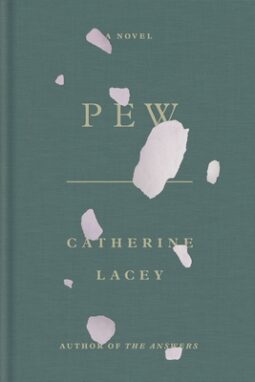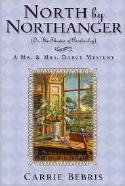This review contains affiliate links, which earn me a small commission when you click and purchase, at no extra cost to you. Thank you for supporting my small business and allowing me to continue providing you a reliable resource for clean book ratings.
A youngish person is found sleeping in a small town’s church, and that person has no memory of life to that point. Members of the church and the community can’t decide this person’s age, gender, or race. And this person, the narrator, speaks only a few words throughout the story to a select few people. So the sleeper is christened Pew, for the time being. The family who sat on the same bench with Pew invites the stranger home to stay with them for a bit.
This story covers the span of a week, delineating each day Pew stays in this unknown Southern town. Pew is passed around to various people during the days, brought along to get-togethers. Pew’s presence is often unnerving; others don’t know what to do when they can’t stick any kind of label on this outsider. Above all, however, Pew’s silence leads others to talk, to share things they typically would not.
Pew, for their part, is unsure why others find it so vital to put them in boxes of any kind, their narration indicating a desire to simply be one with parts of nature, with others, to not be singular.
Pew is an unusual novel; it’s short but not a novella or short story. It could be parable or allegory; it’s difficult to define and label or put into a box, much like its “titular” character. It definitely makes mention of race and issues related to it. It seems to deride certain churchgoing types (flat stereotypes, quite honestly) and hypocrisy. The story builds up to a strange festival at the end of the week and the end of the book, which had me wondering for a long while how much it might bear similarities to Shirley Jackson’s “The Lottery.” The foreboding of this supposedly beautiful, but also unsettling, annual ritual in the town hangs over the story even as Pew goes from place to place listening to townspeople. Given that expectation I read into the book, I was a bit let down with the end, which I can’t say much else about.
Overall, Pew is a book that’s difficult to explain and that, much like its primary character, will likely reflect (and is sure to be meant to do so) the ideas and experiences of the reader. It’s a bit like Silly Putty: it easily changes shape in the hands of the user; it picks up impressions but then absorbs them and returns to a neutral slate. I’m tempted to put it away for a bit (put that Silly Putty in its storage egg) and take it back out and reread to see where it leads me. This is a story that’s best discussed with others; it would make an excellent book club selection.
Rated: High. But it nearly was a mild (I thought for a while it may even be a none!). Total instances of profanity number about 10, with 7 uses of strong language, mostly all used pretty close together (a parrot says it a few times). Sexual or violent content is minimal; there are brief allusions to minor characters confessing to doing bad things.
*I received an ARC of this book in exchange for my honest review.
Click here to purchase your copy of Pew on Amazon.




